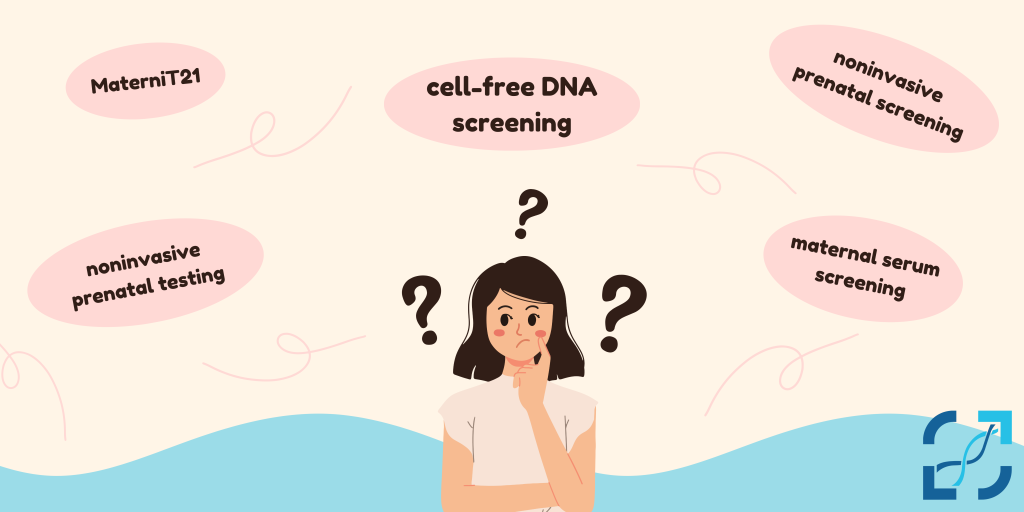More than a decade since a new prenatal screening test was made available clinically. And in these years, healthcare providers have just started to agree on what to call it.
When Sequenom first launched the MaterniT21 screen for Down syndrome in 2011, this type of testing was labeled “Noninvasive Prenatal Diagnosis” or NIPD. The promotion of NIPD was coupled with a tremendous amount of hype that NIPD would replace the need for invasive diagnostic testing such as amniocentesis. However, this kind of technology can only tell us whether a pregnancy has an increased or decreased chance of having a chromosome condition, and cannot definitively provide a diagnosis. It didn’t take too long before we realized that including the word “diagnosis” in the test name was overstated, and so the name was soon dialed back to “Noninvasive Prenatal Testing” (NIPT). But many, most notably the American College of Medical Genetics and Genomics (ACMG), suggested that calling this “testing” did not go far enough to highlight its diagnostic limitations and proposed that this technology be referred to as “Noninvasive Prenatal Screening” (NIPS).
Further, many have expressed discomfort through the years with using any name that includes “noninvasive” at all. Calling a test noninvasive implies a comparison to invasive tests and not to other screening tests. Aren’t all previously available aneuploidy screening tests (first trimester screening, sequential screening, Quad screen, etc.) “noninvasive” after all?
Recently, ACMG has moved away from the term NIPS given their recognition that Nip is an ethnic slur that was used to denigrate persons of Japanese descent and origin during World War II.
The American College of Obstetricians and Gynecologists (ACOG) has referred to the testing as “cell-free prenatal screening” for many years, and the Society of Maternal Fetal Medicine has referred to the testing as “maternal serum cell-free DNA (cfDNA) screening.” ACMG now also recommends a variation on this term, “prenatal cell-free DNA screening.”
So, which term are providers really using in practice? In 2015, the National Society of Genetic Counselors (NSGC) Prenatal Special Interest Group surveyed members regarding what they call this test. This survey found that NIPT was the front runner with 45% of the vote as compared to 31% using NIPS and 23% using cfDNA. Another question to consider is: what name are patients most familiar with? Our review of patient forums reveals that many patients seem to know these tests by specific brand names. This may be attributed to the successful direct-to-consumer marketing campaigns of the testing companies, which prompt patients to “ask your doctor for the Harmony/Panorama/MaterniT21/etc. test by name!” And as any genetic counselor will tell you with a heavy heart, many patients think of and refer to this test as, “the gender test.” This is a troubling association, as the purpose of this test is not to identify the sex of the pregnancy, but rather to screen for chromosome variations (including of the X and Y sex chromosomes) that may impact pregnancy management and decisions. Moreover, no test can accurately predict gender identity.
Developing educational resources is a high priority for us at Genetic Support Foundation. As we continue to develop and refine educational resources, we have spent a lot of time debating what to call this technology. Although we all share the discomfort with the term “noninvasive,” we have maintained the term NIPT in many resources in order to increase access to these tools as this term has historically seemed to be the most recognized. But today, it seems this may be shifting with more uniform adoption of “prenatal cell-free DNA screening,” which has become the preferred terminology used at GSF.While we have you here, we would love to hear your opinion on the best term for this test. Please take a moment to answer this two question survey. And check out our website for a number of resources about cfDNA screening (or whatever you prefer to call it) and let us know what you think!

